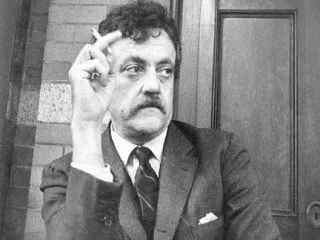
from Dan Wakefield's book "Kurt Vonnegut: Letters"
FORM OF FICTION TERM PAPER ASSIGNMENT
November 30, 1965
Beloved:
This course began as Form and Theory of Fiction, became Form of Fiction, then Form and Texture of Fiction, then Surface Criticism, or How to Talk out of the Corner of Your Mouth Like a Real Tough Pro. It will probably be Animal Husbandry 108 by the time Black February rolls around. As was said to me years ago by a dear, dear friend, “Keep your hat on. We may end up miles from here.”
As for your term papers, I should like them to be both cynical and religious. I want you to adore the Universe, to be easily delighted, but to be prompt as well with impatience with those artists who offend your own deep notions of what the Universe is or should be. “This above all ...”
I invite you to read the fifteen tales in Masters of the Modern Short Story (W. Havighurst, editor, 1955, Harcourt, Brace, $14.95 in paperback). Read them for pleasure and satisfaction, beginning each as though, only seven minutes before, you had swallowed two ounces of very good booze. “Except ye be as little children ...”
Then reproduce on a single sheet of clean, white paper the table of contents of the book, omitting the page numbers, and substituting for each number a grade from A to F. The grades should be childishly selfish and impudent measures of your own joy or lack of it. I don’t care what grades you give. I do insist that you like some stories better than others.
Proceed next to the hallucination that you are a minor but useful editor on a good literary magazine not connected with a university. Take three stories that please you most and three that please you least, six in all, and pretend that they have been offered for publication. Write a report on each to be submitted to a wise, respected, witty and world-weary superior.
Do not do so as an academic critic, nor as a person drunk on art, nor as a barbarian in the literary market place. Do so as a sensitive person who has a few practical hunches about how stories can succeed or fail. Praise or damn as you please, but do so rather flatly, pragmatically, with cunning attention to annoying or gratifying details. Be yourself. Be unique. Be a good editor. The Universe needs more good editors, God knows.
Since there are eighty of you, and since I do not wish to go blind or kill somebody, about twenty pages from each of you should do neatly. Do not bubble. Do not spin your wheels. Use words I know.
poloniøus
Stories from the Mentioned Book:
John Galsworthy "The Apple-Tree" - 39
Saki (H. H. Munro "The Seventh Pullet" - 104
W. Somerset Maugham "Lord Mountdrago" - 112
A. E. Coppard "Arabesque: The Mouse" - 141
E. M. Forster "The Celestial Omnibus" - 150
James Joyce "A Little Cloud" - 170
Virginia Woolf "The New Dress" - 187
D. H. Lawrence "The Rocking-Horse Winner" - 197
Katherine Mansfield "The Daughters of the Late Colonel" - 216
Stella Benson "The Desert Islander" - 242
Aldous Huxley "The Claxtons" - 266
Edith Wharton "The Debt" - 300
Sherwood Anderson "Brother Death" - 318
Ring Lardner "Harmony" - 338
Conrad Aiken "Mr. Arcularis" -361
Wilbur Daniel Steele "For They Do Not Know What They Do" - 385
Katherine Anne Porter "Maria Concepción" - 409
William Faulkner "The Bear" - 433
Stephen Vincent Benét "Too Early Spring" - 453
Ernest Hemingway "My Old Man" - 470
John Steinbeck "Flight" - 487
William Saroyan "The Pomegranate Trees" - 511
Eudora Welty "Old Mr. Marblehall" - 526